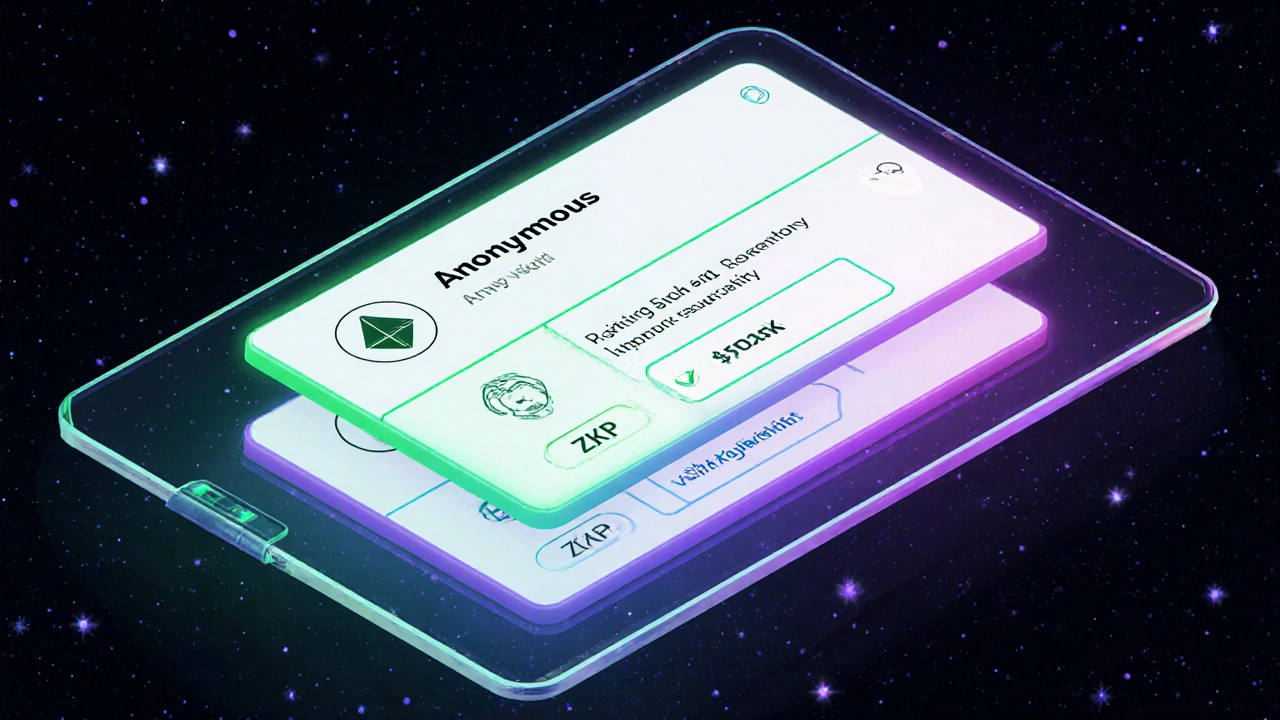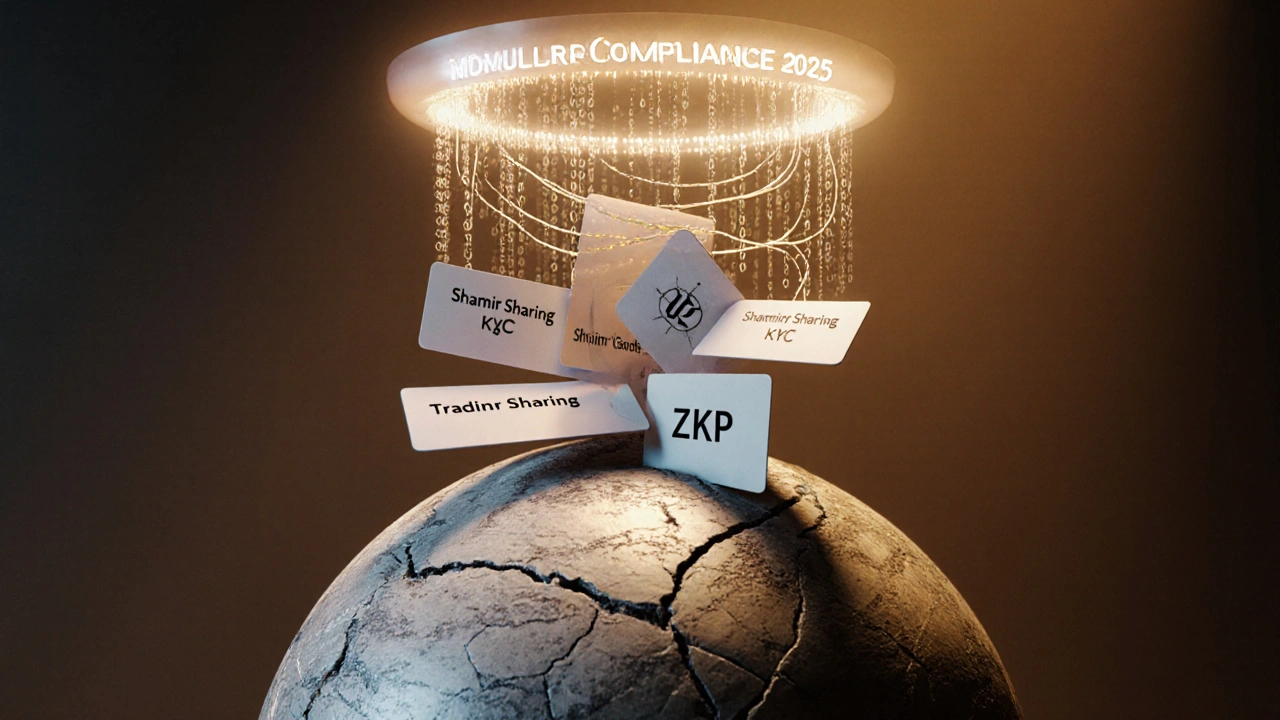Decentralized Finance promised financial freedom without banks. But as DeFi grew, regulators started asking: Who is doing this? The answer isn’t simple. You can’t just slap traditional KYC on a smart contract. So what’s really happening in 2025? How are DeFi protocols staying legal without killing their core idea-permissionless access?
Why KYC Doesn’t Fit DeFi (And Why It Still Matters)
DeFi was built on the idea that anyone, anywhere, could lend, borrow, or trade without asking for ID. No bank account? No problem. No passport? Still fine. That’s the magic. But regulators didn’t disappear. The FATF, SEC, and EU’s MiCA rules now say: if you’re handling money, you need to know who’s using it. The problem? DeFi protocols don’t hold your keys. They don’t control your wallet. So who’s responsible?
That’s where the tension lives. On one side, institutions like hedge funds and family offices won’t touch DeFi unless they can prove compliance. Chainalysis’s March 2025 report found 62% of institutional investors only participate if KYC is built in. On the other side, users in Nigeria, Pakistan, or Venezuela rely on no-KYC platforms because they can’t get verified through traditional systems. A Reddit user from Lagos said it plainly: “I can’t get a national ID. But I can trade Bitcoin on Robosats.”
The old model-force everyone to upload a photo of their passport-isn’t working. And it’s not just inconvenient. It breaks the whole point of DeFi.
What Are the Real KYC Alternatives?
There’s no single fix. But several clever alternatives have emerged-not to replace KYC, but to redefine it.
- Zero-Knowledge Proofs (ZKPs): These let you prove you’re not on a sanctions list without revealing your name, address, or ID. MIT’s Digital Currency Initiative showed ZKP-based verification cuts identity costs by 63% and still satisfies regulators. Platforms like TrueFi use this for uncollateralized lending-users prove eligibility without exposing personal data.
- Reputation-Based Systems: Instead of documents, you build trust over time. Credix, focused on emerging markets, tracks your transaction history across DeFi. The more you use it responsibly, the higher your lending limit. No ID needed. Just behavior.
- Non-Custodial Wallets with MPC: Zengo Wallet uses Multi-Party Computation. No seed phrase. No backup text. Your private key is split across devices. You log in with facial recognition. No personal info stored. You can swap tokens, stake, lend-all anonymously. Over 120 cryptocurrencies supported.
- Hardware Wallets with Shamir Sharing: Cypherock’s hardware wallet splits your seed into four physical cards. You need three to recover. FIDO2 certified. No cloud. No identity. Just physical security.
- Protocol-Level Optional KYC: Uniswap doesn’t require KYC. But its fiat on-ramp partner, Circle, now offers optional identity verification. If you want to deposit $10,000 via bank transfer, you verify. If you just want to swap ETH for DAI using MetaMask? No problem. This is the future: compliance only where it’s legally required.
These aren’t hacks. They’re engineered solutions. And they’re growing fast. The DeFi compliance infrastructure market hit $14.7 billion in Q1 2025, up from $8.1 billion just a year before.
How Major Protocols Are Handling It
Not all DeFi platforms are the same. Their approach depends on their design, audience, and legal risk.
- Uniswap: No KYC at the protocol level. But since May 2023, it blocks U.S. IP addresses entirely. It’s not compliance-it’s avoidance. A workaround, not a solution.
- dYdX: The trading protocol itself doesn’t require ID. But if you use a fiat gateway like MoonPay or Ramp, you’ll be asked to verify. Hybrid model. Clean separation.
- PancakeSwap: No KYC. No restrictions. Popular in Southeast Asia. But it can’t support direct bank deposits. Users must buy crypto first, then swap. Limits institutional use.
- OpenPeer: A peer-to-peer exchange built on Ethereum and Polygon. No KYC. No identity. Just smart contract escrow. 15,000+ trades monthly. Users trade Bitcoin, USDC, and ETH with $1,400 limits per trade. Works because it’s decentralized, not a centralized exchange.
- TrueFi: Lends crypto without collateral. How? Reputation. Your lending history, transaction volume, and on-chain behavior determine your credit limit. No documents. No waiting. 8% of the uncollateralized lending market captured in 2025.
What’s clear? Protocols that try to force KYC everywhere lose users. Protocols that ignore compliance risk fines, lawsuits, or being blocked entirely. The winners are the ones that make compliance optional, modular, and user-controlled.

Who’s Building the Compliance Tools?
Behind the scenes, companies are racing to build the plumbing for compliant DeFi.
- Chainalysis: The giant. Screens 45+ blockchains. Processes billions in transactions. Used by exchanges, banks, and regulators. Pricing? $25,000 to $500,000 a year. High-end, but heavy. Many developers say their API is complex and slow to integrate.
- Elliptic: Known for cross-chain risk detection. Handles 1.2 million transactions per second. Used by institutions that need real-time monitoring. Their Chief Scientist says tracking funds across 17 blockchains is now essential.
- ComplyAdvantage: Real-time sanctions screening. Updates 1.8 million watchlists daily. Popular with enterprises. Users praise speed but complain about integration taking weeks.
- Notabene: Specializes in the Travel Rule-sending transaction info between VASPs. Supports 50+ providers. Critical for platforms that do fiat on-ramps.
- Sumsub: Offers KYC-as-a-service. Onboarding takes 21 days on average. Requires 3-5 developers. 43% of users report delays of 7-10 days. Still used by many DeFi projects trying to go mainstream.
These tools work-but they’re designed for centralized platforms. Integrating them into a fully decentralized protocol is like fitting a square peg in a round hole. That’s why newer, decentralized alternatives are gaining ground.
The User Experience: What People Actually Feel
Behind every protocol is a person trying to use it.
On Reddit, u/CryptoPrivacyAdvocate said: “Jumio froze my account during verification. Switched to Zengo. Now I trade daily without stress.” That’s the win. No paperwork. No waiting. Just access.
But users of no-KYC platforms like Robosats face trade-offs. One user from Venezuela wrote: “I can trade Bitcoin here, but I need 12 separate trades to get $16,000. It’s slow, but it’s the only way.” The $1,400 limit isn’t a bug-it’s a legal shield. But it’s also a barrier.
Koinly’s April 2025 survey of 1,243 users found:
- 61% prefer optional KYC-basic functions free, enhanced features require verification.
- 29% would pay 0.15% higher fees for built-in tax reporting and compliance.
- 43% hate 7-10 day onboarding delays.
- 37% get flagged for false positives-legitimate trades blocked because of sketchy wallet history.
Regional differences are stark. In Nigeria and Pakistan, 82% of users succeed on no-KYC platforms. In the U.S. and EU, only 35% can even get past KYC hurdles. That’s not a tech problem. It’s a justice problem.

The Future: Modular, Not Mandatory
The biggest shift in 2025? The move away from “all or nothing.”
The World Economic Forum launched the Decentralized Identity Alliance in April 2025-with 37 projects building ZK-based identity standards. Uniswap Labs integrated Circle’s optional KYC layer. Ethereum’s upcoming EIP-7252 will let apps request identity checks without touching the core protocol.
This is the blueprint: compliance as a layer, not a wall.
Imagine this:
- You open your wallet. Swap ETH for USDC. No ID needed.
- You want to borrow $50,000? You click “Verify for Higher Limits.” A ZKP proves you’re not a sanctioned entity. Done in 10 seconds.
- You want to link your bank? Circle’s KYC kicks in. You upload your ID. That data never touches the blockchain.
That’s the future. Flexible. User-controlled. Regulator-approved.
And it’s already here. OpenPeer processed $28.7 million in Q1 2025 with zero identity verification-because they didn’t try to force KYC. They built transparency into the protocol itself. Every transaction is public. Every counterparty is traceable. That’s compliance without compromise.
What This Means for You
If you’re a user:
- Try Zengo or Cypherock if privacy is your priority.
- Use Robosats or OpenPeer if you’re in a region with limited banking.
- Opt into optional KYC only when you need higher limits or fiat access.
If you’re building or investing:
- Avoid protocols that force KYC on everyone. They’re fighting the wrong battle.
- Look for platforms using ZKPs, reputation systems, or modular compliance.
- Ask: “Can this protocol function without identity?” If yes, it’s more likely to survive regulation.
DeFi isn’t going away. Regulation isn’t going away. The winners won’t be the ones who pick a side. They’ll be the ones who built bridges.
Can I use DeFi without any KYC in 2025?
Yes, you can. Many protocols like Uniswap, PancakeSwap, Robosats, and OpenPeer don’t require KYC at the protocol level. You can swap tokens, stake, and lend without submitting ID. However, if you want to deposit fiat from a bank or access higher trading limits, you’ll likely need to go through a KYC-enabled on-ramp. The key is choosing platforms that keep core functions open while making compliance optional.
Are no-KYC DeFi platforms legal?
It depends on your location and how the platform operates. In the U.S. and EU, regulators target centralized intermediaries-not fully decentralized protocols. So platforms like Uniswap avoid direct legal exposure by blocking certain regions. No-KYC platforms that facilitate peer-to-peer trades without holding funds (like Robosats) operate in a gray zone. They’re not illegal per se, but they risk being shut down if regulators deem them facilitators of illicit activity. Always check local laws.
What’s the safest DeFi wallet without KYC?
Zengo Wallet and Cypherock are two of the safest options. Zengo uses Multi-Party Computation (MPC) to eliminate seed phrases and requires only facial recognition for access. Cypherock uses physical cards with Shamir Secret Sharing-no cloud storage, no backups you can lose. Both support over 120 cryptocurrencies and keep your identity completely private. Neither stores your data or requires registration.
Do I need KYC to use DeFi on my phone?
No, you don’t. Apps like MetaMask, Trust Wallet, or Zengo let you connect to DeFi protocols directly from your phone without KYC. You only need to verify your identity if you use a fiat gateway like MoonPay, Ramp, or Circle to buy crypto with a bank card. For pure crypto-to-crypto interactions, no ID is required.
Why do some DeFi platforms block U.S. users?
U.S. regulators like the SEC have taken aggressive enforcement actions against DeFi platforms they believe are operating as unregistered securities exchanges. To avoid lawsuits, platforms like Uniswap and PancakeSwap block U.S. IP addresses entirely. It’s not about technology-it’s about legal risk. They’d rather lose U.S. users than face fines or shutdowns.
Is zero-knowledge KYC actually trusted by regulators?
Yes, increasingly so. The FATF updated its guidance in January 2025 to recognize decentralized identity solutions as potential compliance tools. MIT’s research proved ZKPs can meet AML requirements while preserving privacy. Regulators care about outcomes-can you prove a user isn’t sanctioned?-not the method. ZKPs deliver that proof without exposing personal data, making them one of the few solutions that satisfy both privacy advocates and regulators.
What’s the biggest risk of using no-KYC DeFi?
The biggest risk isn’t hacking-it’s isolation. No-KYC platforms often can’t connect to banks, so you can’t easily cash out. You’re stuck holding crypto. Also, if you’re using a platform that’s later deemed non-compliant, your funds could be frozen by exchanges or payment processors. Plus, you won’t get tax reporting tools built in, making it harder to file accurately. Privacy comes with responsibility.
Will DeFi ever require mandatory KYC for everyone?
Not if the community has any say. A CoinGecko poll in April 2025 showed 63% of users would leave DeFi if mandatory KYC was added at the protocol level. The industry knows that. That’s why every major player is moving toward optional, modular compliance. The future isn’t “KYC or bust.” It’s “KYC if you need it.” That’s the only model that keeps DeFi alive and legal.


Comments
Kenny Stockman
Honestly, I just use Zengo now. No seed phrase, no stress. Swap ETH for DAI, stake, whatever - it just works. Regulators can scream all they want, I’m not handing over my face data to some third-party KYC bot.
Antonio Hunter
It’s fascinating how the industry is evolving from a binary choice - KYC or chaos - to something more nuanced. The real innovation isn’t in the tech itself, but in the architecture: compliance as a modular layer, not a monolithic gate. Think of it like a car with optional airbags. You don’t need them to drive, but if you’re going on the highway, you can activate them. That’s the future. And honestly, it’s the only path that doesn’t kill DeFi’s soul while still letting it survive in the real world.
Paritosh Bhagat
Guys, I just want to say - this is why I love crypto. No KYC means no discrimination. In India, banks reject people for having the wrong last name or too many loans. But here? I traded $2000 worth of USDC on Robosats last week. No ID. No questions. Just pure freedom. And yes, it’s slow - 12 trades to get $16k - but at least I’m not begging some bank clerk for permission to exist. 🙌
Ben De Keersmaecker
Interesting how the regulatory landscape is forcing innovation rather than suppressing it. ZKPs aren’t just a workaround - they’re a paradigm shift in identity verification. The fact that MIT proved they satisfy AML requirements without exposing PII suggests regulators are more pragmatic than we assume. It’s not about control - it’s about auditability. And if the blockchain already provides transparency, why add centralized identity? The answer: you don’t need to.
Aaron Elliott
Let’s be clear: this entire "optional KYC" narrative is a performative illusion. The moment you interact with a fiat on-ramp, you’re already under the thumb of centralized entities. Circle, MoonPay, Ramp - these are not decentralized. They are regulated financial institutions with KYC baked into their core. So calling it "compliance as a layer" is misleading. It’s not a layer - it’s a backdoor. And the protocols that enable it are merely outsourcing their legal liability. DeFi is dead. Long live DeFi-adjacent.
Chris Heffron
Love the Zengo mention 😊 Totally ditched MetaMask after my seed got phished. Now I just tap my face and go. No backups, no panic. Also, Cypherock cards? Genius. Like a physical USB you can’t lose unless you burn your house down 🏠🔥
Adrienne Temple
My cousin in Nigeria uses Robosats every week. She can’t get a bank account, but she buys crypto with airtime credits and swaps for USDC. She pays a little more in fees, but she feeds her family. That’s not a loophole - that’s justice. 🤍
Sandy Dog
OKAY BUT WHAT IF THE GOVERNMENT JUST SHUTS DOWN ZENGO NEXT WEEK?? 😱 I mean, like, what if they just say "no more facial recognition for crypto" and then BOOM - your wallet is frozen?? And then you lose everything?? And then you’re stuck with 12 ETH you can’t sell because no one will touch it?? I just… I can’t sleep at night thinking about this. 😭
Nick Rios
Reading this made me realize something: the real winners aren’t the platforms that avoid regulation - they’re the ones that let users choose. It’s not about being anarchist or compliant. It’s about autonomy. You want to trade small? Go ahead. You want to borrow $50K? Prove you’re not a criminal. Simple. Elegant. No drama.
Amanda Harkins
It’s weird how we treat compliance like it’s the enemy. But if you think about it - taxes, insurance, even your phone carrier - they all have rules. DeFi just needs to catch up. The fact that ZKPs let you prove you’re clean without revealing who you are? That’s not compromise. That’s evolution.
Jeanie Watson
So… we’re just pretending this is all fine because some people in India can’t get IDs? Meanwhile, my tax software flagged my $300 swap as "suspicious activity" because the wallet I sent it to had a 0.01 ETH transaction from a darknet market 3 years ago. So now I have to manually prove I didn’t buy cocaine with crypto. Thanks, AI.
Tom Mikota
So… you’re telling me… that if I use a wallet with MPC… and a hardware wallet with Shamir sharing… and only trade on protocols that don’t require KYC… and avoid fiat gateways… I’m basically a crypto anarchist with a PhD in security? 😏
Mark Tipton
Let me be the one to say it: ZKPs are a Trojan horse. The same entities that built Chainalysis and Elliptic are now funding ZKP research. Why? Because they know the blockchain can’t be controlled without identity - so they’re building a new identity layer that looks decentralized but is still under their control. This isn’t freedom. It’s rebranding. The FATF didn’t change its mind - it just got smarter. And so did the surveillance state.
Adithya M
Great breakdown! But one thing missing: what about cross-border tax implications? If I use OpenPeer from India and send USDC to a friend in Brazil, who reports that? No KYC = no audit trail = IRS or CBDT might still come knocking. Compliance isn’t just about access - it’s about accountability. We need tools that auto-generate reports without KYC. That’s the next frontier.